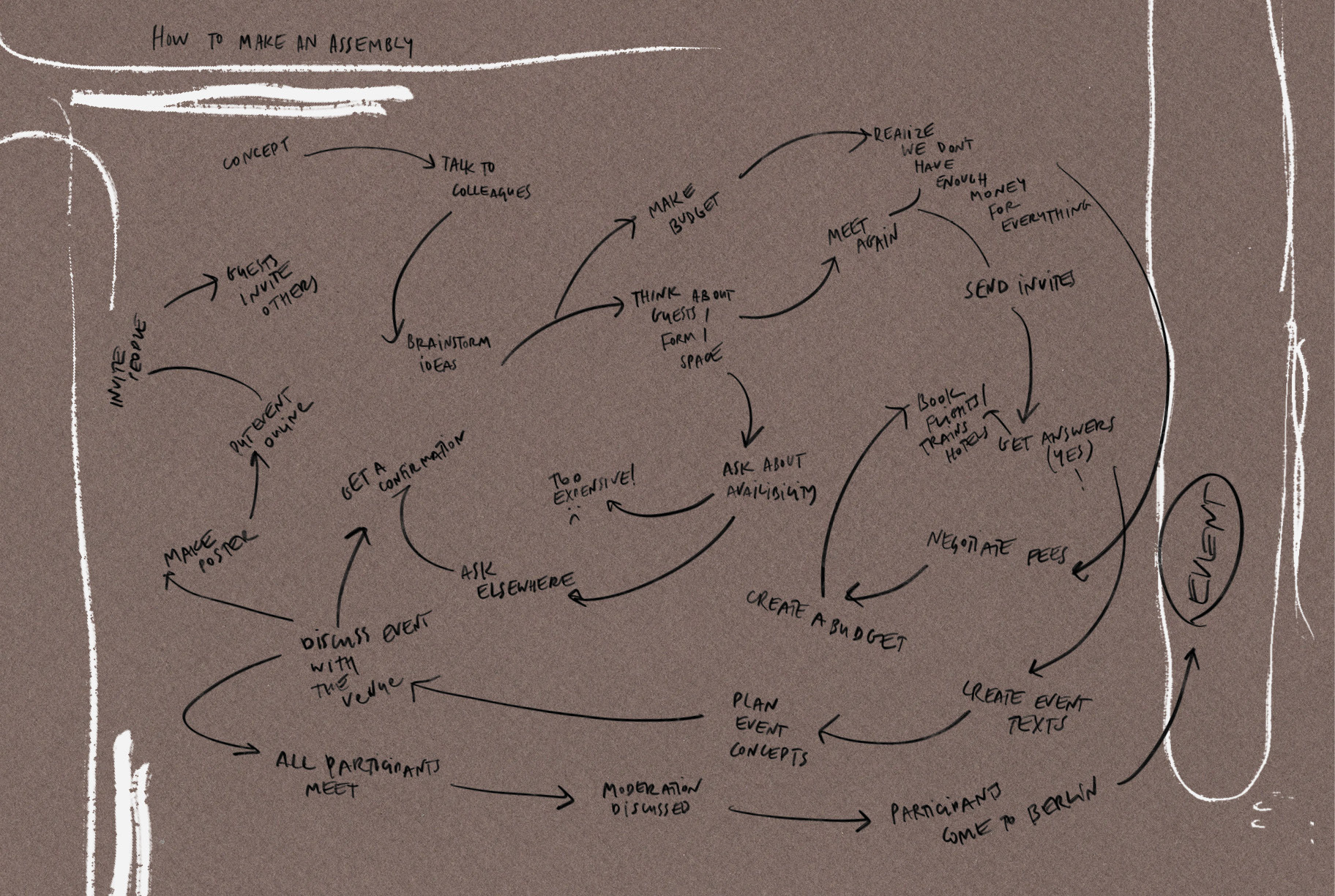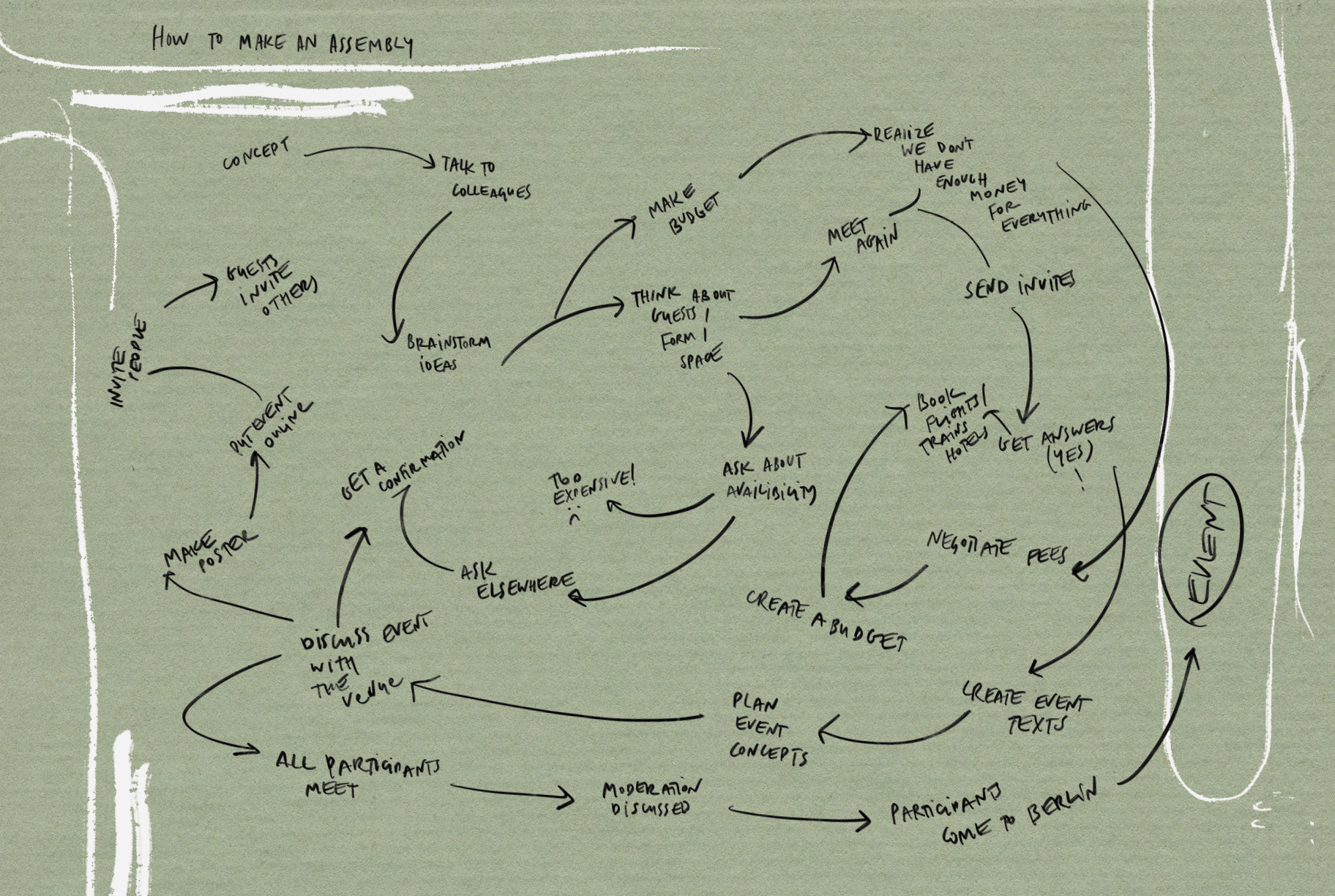politics of (dis)assembling

assembly 19.06.2023 19:30
WITH T.J. Demos, Marwa Arsanios, ON/OFF Collective, Patu
organized by The Collaborative Research Center "Intervening Arts" at the Freie Universität Berlin
Language The spoken language at the event is English with a possibility for informal translation to German.
ACCESS The space is accessible by wheelchair. Should you have any other specific accessibility needs, please contact Jannika Hinz at jannika.hinz@fu-berlin.de and we will do our best to accommodate them.
Through a discursive and experimental format, politics of (dis)assembling explores forms of assembling as artistic and political interventions. Given the current and ongoing transformation of political spaces of appearance the series responds to the aesthetic and political quality of assembling today. politics of (dis)assembling acts as a space of gathering and discussion to critically engage with forms of assembling that enable a dynamic state of coming together while moving away from institutional and organizational conventions that are marked by stale protocols and rules. During the forum, invited scholars, artists, and activists, as well as the participants, are invited to an evening of reflection, shared meals and dynamic exchange.
By placing a focus on processes of assembling, several correlated issues come into focus.
Firstly, the notion of solidarity is investigated and understood as a political form; the capacity of assemblies to act as a prefigurative practice that envisions alternative ways of social, political, and cultural gathering is explored. Thus, how do assemblies create alliances and solidarity between different struggles that go beyond spatial and temporal boundaries to reach radical equality? Can this even be achieved? How can art be a call to action and an engine for this?
Furthermore, the series engages with the aesthetics of activist art as it is connected to social movements, asking what role diverse practices of (dis)assembling might play in the context of critical interventions into the aesthetics of space, history, and violence. How might these dynamic strategies advance anti-patriarchal, antiracist and other emancipatory modes of struggle that seek to challenge, expose or even transform hegemonic structures of power embedded in capitalism?
The aesthetic practices in question aim at making other intersubjective relations, futures, and social structures imaginable. As such, they are always in tension with the social reality into which they intervene. In order to be effective, they rely on certain prevailing material structures, symbolic regimes, and aesthetic habits which they simultaneously try to transform.
By bringing together the artist Marwa Arsanios and the art historian T.J. Demos, Politics of (Dis)Assembling will explore the potential of the arts to change current politics and redesign a different, more just future. While Marwa Arsanios investigates strategies for structural and infrastructural change for communities, T.J. Demos’ research explores potentialities for alliances and diplomacy between different struggles. How, then, as Marwa Arsanios’ practice suggests, can we learn from a particular aesthetic of political movements? Conversely, how can artistic practices inspire political action? What forms of mutual aid and solidarity are practiced in these contexts, and how they can propose different ways of gathering and organizing? Moreover, which forms of support can institutions deliver? And ultimately, what role do artists play in changing our expectations for the future?
In addition, both parts of politics of (dis)assembling will be accompanied by the ON/OFF Collective, who will engage with the spatial structure of the assembly as well as Patu, who will document the events through a series of illustrations.
organized and designed by Naomi Boyce, Sambojang Ceesay, Judith Henrike Pieper, Lena Pozdnyakova, João Gabriel Rizek, Luise Willer, Felix Werfel, with support from Jannika Hinz, Tobias Yale Rosen and Imyeon Han from the Collaborative Research Center “Intervening Arts” at the Freie Universität Berlin.
TEAM SAVVY The event is hosted and supported by Meghna Singh, Kelly Krugman, Lema Sikod and Anna Jäger
Tech Rey Uferlos
support The event is funded by the German Research Foundation.

